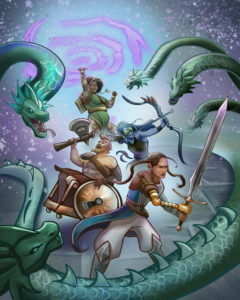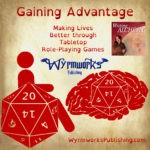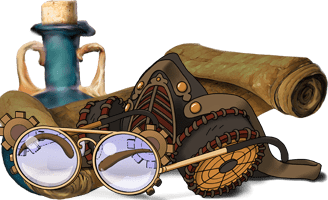Accessibility in a Fantasy World
What is an accessible world?
Most tabletop roleplaying games focus on obstacles to overcome, not accessibility, so this question may seem like a non-sequitur, but what happens when we consider accessibility from a different perspective? Yes, all characters will have challenges in the wilderness, as the wilderness provides different obstacles for different people. Druids and rangers, regardless of whether they’re disabled, will have developed strategies to thrive in their preferred environment and can probably help those more accustomed to population centers. In the wilderness, the obstacle is the environment, and you bear the responsibility of survival and attaining your goals using the environment and the resources you bring, either individually or as a party, and everyone in a party contributes to the whole using their unique skills. The wilderness is accessible when you can collectively use available resources to survive and achieve your goals in it.
But once you pass through the city gates, the responsibility expands to the entire community, not just the party. A city is a big party of dozens or thousands of individuals, again each contributing to the whole for survival and attaining the goals of the community using the environment and the resources each brings, and just like in the wilderness, the obstacle is the environment. But population centers have the advantage of using the environment, whether socially or physically, more permanently for the benefit of the entire community. Regardless of whether the environment is wilderness, rural, or urban, each person has strengths and challenges as they interact with the environment, whether you’re a druid trying to adapt to an urban environment or a barbarian to a wizard’s tower, relying on each other’s strengths to help with your challenges. Any environment is accessible when you can collectively use available resources to survive and achieve your goals in it.
This project intends to improve inclusion and accessibility in all areas of life, starting at the gaming table but extending out into the world, so we hope the creativity of the gaming community will make the real world more fantastic for everyone.
Cultural Accessibility
The impairments are annoying, but I can live with those. What is disabling is the inaccessibility of and lack of acceptance by society.
Jerome van Leeuwen
When a culture gives equal value to every person, accessibility follows as societal structures are designed with the entire community in mind. This can only happen with representation in the governmental and social leadership structures, since the only way to know what specific groups or individuals need is to hear from them, and the sooner the leadership seeks that diverse input, the fewer repairs will need to be made later.
In a fantasy world, we have the opportunity to build that structure from the start, and even if you haven’t built it into your campaign world, fantasy revisions and construction tend to be noticeably more affordable than in the real world. While Wyrmworks Publishing plans to release a future supplement that will provide a campaign world with these principles woven through it, here’s some things to keep in mind as you explore these concepts in your world that will hopefully flow into the real world through your game table.
Cultural Attitudes
People tend to surround themselves with others who share their experiences and perspectives. This can lead to prejudice, fear, contempt, discrimination, and exclusion. A culture of access takes intentional steps to promote inclusion and integration. The more people listen to each other, the better they understand and empathize. How do your world’s population centers deliberately bridge people of different cultures, beliefs, and abilities? How is that effective? Has a misunderstanding caused communication to break down in a way that the adventurers need to stabilize? Has ignorance or fear put someone in danger?
Emotional Spell Slots
Even in the most welcoming world, life brings its own challenges, which can be exhausting. Casters aren’t the only ones with spell slots — we all have limits to our physical, mental, and emotional energy! This can get further complicated for people who have to navigate an inaccessible environment or culture, but even the communication necessary to promote understanding and accessibility can exhaust those emotional and mental slots. You can only explain so many times why you use a wheelchair but can still stand, how you have depression but aren’t sad all the time, or how you’re blind but can still see a little before you say, “I’m done. No more.” While accessibility means listening, it also means allowing others to save their energy by refraining from explaining.
Organizational Accessibility
Just as a party with elves and humans still needs to take an eight-hour long rest regardless of whether the elves need that much time, accessibility includes designing our organizations and plans around its party members’ needs. Whether the wizard needs time to find spell components or to find a sage with the capability to convert their spellbook into a tactile language, whether the party needs time for the fighter to get into her armor or the cleric to put on his leg braces, this awareness applies to both fantasy and reality. What adjustments can you make to your habits to make their world more accessible? A small change in your behavior can make a huge difference for someone else’s well-being and participation.
Communication Accessibility
A scroll with a scrying spell can help gather information, but it’s useless to a barbarian. The same applies to other forms of communication, so accessibility means communicating in a way that those who need the information can receive it. Sometimes, this means speaking in Thieves’ Cant. Other times, it means using a sign language (which are usually different for each culture, so consider including as many sign languages as spoken languages), Tactile Writing such as Braille, or a tactile language such as tapping or rubbing patterns on a person’s skin, which you can include in your game as optional language skills the same way using modern communication tools in the real world improves accessibility to those who need it. How do your worlds make communication accessible? Has something interfered with communication in your game that the characters need to deal with? Does a school or other institution need some equipment that your characters can acquire?
Physical Accessibility
Whether a sheer cliff, a fortified keep, or a torrential river, every world presents obstacles for all, and manufactured structures can also provide these obstacles, whether intentional or not. A staircase isn’t just an obstacle to a wheelchair user — it’s uncomfortable to traverse for anyone not roughly the same height as the designer, whether a halfling or an ogre in a human-centric fantasy environment. But ramps don’t necessarily provide access to everyone — using a ramp with a cane or crutches has its own challenges. A space designed to amplify sound for the hard of hearing can be unbearable to the Hyperacusis. So how do you make your fantasy spaces more accessible to all? How can your party work together to navigate challenging environments, whether urban or wilderness, physical or social, mundane or magical? And how do those creative solutions provide opportunities in the real world?










 👀 Get 10 Free Adventures
👀 Get 10 Free Adventures
Comments
Accessibility in a Fantasy World — No Comments
HTML tags allowed in your comment: <a href="" title=""> <abbr title=""> <acronym title=""> <b> <blockquote cite=""> <cite> <code> <del datetime=""> <em> <i> <q cite=""> <s> <strike> <strong>